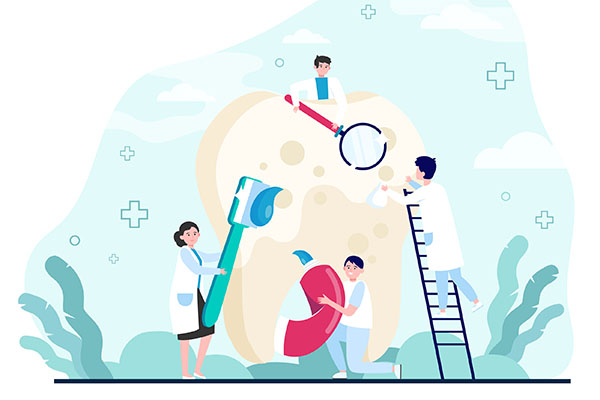 Regular dental cleaning is a small effort with a payoff that can last a lifetime. This may sound like a bold claim, except that it happens to be true. Read on to learn why routine dental visits are good for your oral health.
Regular dental cleaning is a small effort with a payoff that can last a lifetime. This may sound like a bold claim, except that it happens to be true. Read on to learn why routine dental visits are good for your oral health.
Dental cleaning in a nutshell
Routine dental checkups come in two parts. The first half consists of a thorough dental exam that checks for a wide range of oral health issues. Ideally, the patient’s teeth, gums, and oral cavity should be in perfect health. But if the dentist spots a problem, they will take corrective measures to restore the health of the problem area. These are the steps a dentist will take after clearing their patient for deep cleaning:
- The application of topical anesthetic to keep the patient comfortable during the cleaning.
- Scaling (scrubbing) to remove plaque buildup and tartar.
- Polishing of the teeth with gritty toothpaste and an electric toothbrush.
- Application of fluoride treatment and sealant to protect and reinforce the enamel.
3 Reasons to get regular dental cleanings
Dentists also use routine checkups to give feedback and advice to their patients. They use their knowledge to guide different aspects of the oral habits of their patients. Here are some of the other reasons to add two routine checkups to the annual calendar.
1. The dentist can catch small problems early on
A small cavity is easy to reverse, even without the use of sharp tools. It may only take a fluoride application to re-mineralize sections of enamel with tiny cavities. It is similarly easy to treat early-stage gum disease and small oral injuries.
Regular dental visits allow dentists to catch and reverse small problems without the use of invasive dental procedures. However, skipping a routine dental check leaves small oral health issues the opportunity to grow into bigger oral health issues. This results in corrective procedures that are more invasive than they need to be.
2. Deep cleaning presents an opportunity for oral cancer screening
The dental exam that precedes teeth cleaning can yield a lot of information. Not only can a dentist detect dental issues, but they can also spot tell-tale signs of oral cancer or thyroid problems. There are many ways in which routine dental checks reveal useful information about patients’ systemic health.
3. Professional teeth cleaning prevents gum disease
Deep cleaning of the teeth involves scaling, which is the removal of plaque and tartar. Routine dental visits, therefore, prevent runaway tartar that could cause mild, moderate, or severe gum disease.
Better still, dentists provide advice and feedback that improves the patient’s oral hygiene between visits.
Preventative dental care pays off
As you can see from reading the above, it is clear that routine dental visits are important. Our practice offers the kind of first-line dental care to maintain optimal oral health. We offer exams and dental cleaning that keep your mouth healthy. Get in touch with us today to schedule your next dental cleaning.
Request an appointment or call Artisan Dental Bellevue at 425-454-2005 for an appointment in our Bellevue office.
Related Posts
Dental hygiene and fresh breath go hand in hand, and for many patients, a regular dental cleaning is a crucial part of their oral care routine to have healthy teeth and gums and avoid bad breath, or halitosis.In this article, we delve into dental cleaning and its relationship with bad breath. We explore how routine…
Dentists perform dental cleaning to prevent problems like tooth decay and gum disease. A dental cleaning procedure is more intensive than your daily oral hygiene routine.Read on to find out why aftercare is necessary after a dental cleaning. The following also explains how to care for your teeth after professional teeth cleaning.Dentists advise their patients…
A dental cleaning is performed to remove plaque and tartar that can naturally build up on teeth and along the gum line. The process is non-invasive and takes less than an hour to complete. It is helpful to understand the steps involved with the dental cleaning process before the day of the appointment.While every experience…









